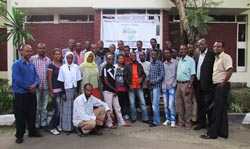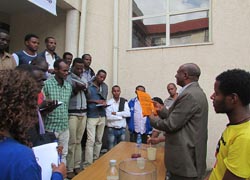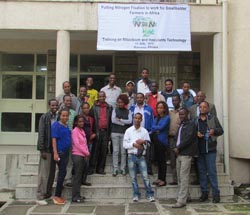Pulses are important food and cash crops for farmers and rural households in Ethiopia. Pulses are the second most important element in the national diet, providing the principal protein source and important dietary supplement to cereal consumption. Pulses recently have regained significance as export commodities. Despite the economic and food security importance of these crops, actual smallholder farm yields are far below the potential production, e.g. 1.3 t/ha for common bean and 1.5 t/ha for chickpea and faba bean. Targeting technologies for legume production in farming systems, N2Africa is an important project for Ethiopia. The Ethiopian Ministry of Agriculture (MoA), Federal and Regional Agricultural Research Institutes and the Agricultural Transformation Agency (ATA) have identified Rhizobium inoculant as the main priority intervention in Integrated Soil Fertility Management (ISFM). Partnering to these institutions, N2Africa will be supporting them to achieve their goals.
As a follow up to the workshop at ILRI "Exploring opportunities for N2Africa in Ethiopia" in May 2012, Ken Giller and Esther Ronner visited Ethiopia in February 2013 and discussed N2Africa activities for this year with project partners at Bahir Dar, Debre Zeit and Addis Ababa. The regional and federal research institutes and universities are the main actors for implementing the N2Africa project in Ethiopia, including the Ethiopian Institute of Agricultural Research (EIAR), Amhara Agricultural Research Institute (ARARI) in collaboration with Bahirdar University (BU), Oromia Agricultural Research Institute (OARI), and Hawassa University (HwU) in collaboration with Southern Agricultural Research Institute (SARI). Operating under the umbrella of EIAR, Debrezeit, Melkasa and Pawe agricultural research centers are also important partners in the project. ILRI will act as lead contractor for N2Africa and will coordinate the project in Ethiopia, next to its role as advisor and collaborator on aspects relating to the use of legume crop residues for animal feeding across the different N2Africa countries.
The strategy for implementing the N2Africa project in Ethiopia is to work in partnership with these institutions in four regions, Benishangul Gumuz (EIAR), Amhara (ARARI and BU), Oromia (OARI and EIAR) and Southern Regions (HwU and SARI). During this growing season, a season bridging to the envisaged Phase II in 2014, N2Africa project activities are now in progress at two Woredas (districts) in each of the four regions where the target legumes are widely grown: chickpea (Amhara, Southern Region and Oromia), faba bean (Amhara and Oromia), soyabean (Oromia and Benishangul) and common bean (Southern Region, Oromia and Benishangul). In the different Woredas, on-farm demonstrations of the best available legume technologies (varieties, inoculants and P-fertilizer) will be established on five farmer’s plots in three Kebeles (villages) per Woreda. These on-farm demonstrations at Kebeles are led by Development Agents (DAs: community based MoA extension facilitators). Overall, the project will have 170 on farm demonstration plots established over the four regions during the main growing season in this bridging year.
|
N2Africa training workshop participants from different locations in Oromia, Bishoftu, 21 June, 2013 |
Workshop participants actively attending demonstrations on inoculation of seeds |
N2Africa training workshop participants from Southern region, Hawassa, 11 July, 2013 |
The N2Africa project prioritized demonstration and dissemination of available technologies for improved legume productivity and livelihoods of smallholder farmers. However, input and variety trials, aimed at generating new knowledge, are part of the activities as well. The latter are conducted at farmers training centres (FTC) in at least one of the three Kebeles in each of the target Woredas. N2Africa project, while providing knowledge on inoculant and legume technologies, brings about synergies among partner institutions:
- The federal and regional agricultural institutions have varieties identified for various locations.
- The MoA has Development Agents who are working at grass root levels (villages) in the community, an important element to pass legume technologies available at hand to small holders.
- Elite rhizobium strains compatible to target legumes were identified from indigenous isolates and shelved at universities and research institutes.
- Private partners who are emerging as inoculant producers benefit from N2Africa’s engagement in intensification of legume technologies in farming systems.
- N2Africa will be working in collaboration with ILRI on aspects of legume production and feeding legume residues to livestock.
- Collaborations in activities on fertilizer packages and linkages to market (IFDC) are important elements in the process.
In brief, in the beginning of July soyabean and common bean demonstration/ dissemination/ knowledge generation plots have been established in Oromia (at Bako and Adje). While writing this note for the N2Africa podcaster, planting of common bean is going on at Boricha site in the Southern Region. Paralleled to the size of Ethiopia and the diversity of its climate, planting times differ at different locations. Thus, planting of common bean will be effected by the end of July at Pawe while planting of faba bean and chickpea continues from end of July to first week of September, depending on the location. To equip researchers and grass root practitioners (the DAs) with the necessary knowledge on rhizobia, inoculation and inoculant technology and to make sure partners correctly apply the protocols N2Africa supplied (common to all countries N2Africa is operational), we conducted training workshops at Debrezeit (Oromia) and at Hawassa (Southern region). We would be conducting the last workshop at Bahirdar (North), perhaps when this podcaster is in printing. Despite the slow start late in the growing season, N2Africa activities are now accelerating fast. Seeing at the germinating plans in the field, we look forward that the N2Africa project is fruitful and rewarding.
Endalkachew Wolde-Meskel, N2Africa coordinator, Ethiopia



